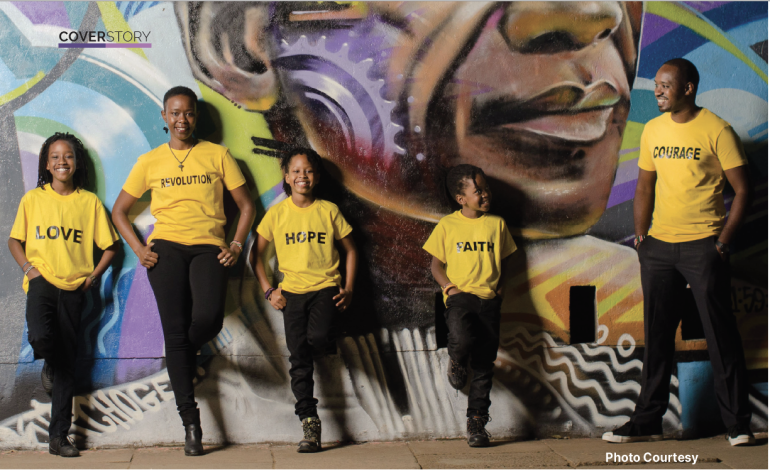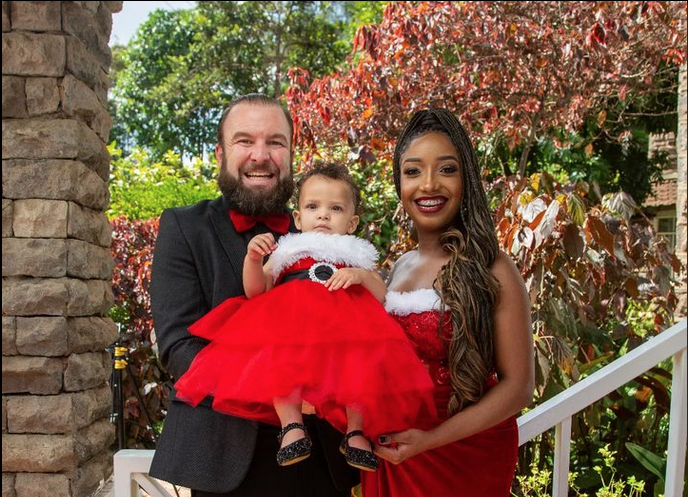Njeri & Boniface Mwangi: Finding balance between life and activism

To most people, Boniface Mwangi needs little to no introduction. His is a familiar face synonymous with activism in the country in words and in deed, including taking pigs to parliament in protest of MPs increasing their already hefty salaries. He is also an award-winning photographer, something that has taken the backburner in favour of his activist role. However, his photography is what set him on the path he is on now.
After the 2007-2008 post-election violence, whose gory details he captured through his lens, Boniface organised a public exhibition of his photos to sensitise Kenyans. And on June 1, 2009, normally set aside in celebration of Madaraka Day, he stood up, a lone man in a crowd of thousands, and called out the then president H.E Mwai Kibaki during his address. It naturally did not go down well. He was promptly roughed up out of the stadium and arrested. However, he had long decided on this path and even being labeled a heckler, a troublemaker or rebel was not a deterrent.
His wife Njeri, on the other hand, is private. Even then, she has become a more familiar face in the recent past. However, if there is one person who has truly been there through it all, bearing the secondary trauma of the arrests, the beatings, the sleepless nights and the death threats, she takes the crown.
For better and for worse
This interview takes place a day after Boniface, 36, and his wife Njeri, 39, celebrate their wedding anniversary. They are jovial and in high spirits, as can be expected after their milestone. Bonnie, as many people call him, and Njeri have known each other for 14 years and have been married for 12 of those.
Undoubtedly, all marriages have their ups and downs but theirs has been presented with unique circumstances over the years that another anniversary is cause for celebration. The two are still going strong since their first meeting in June 2006 at Steers restaurant along Muindi Mbingu Street. While he liked how she put her points across, she instantly took to him because he had a motorbike and wore his heart on his sleeve. Now, over a decade in marriage and three kids down the line, the two admit that if anything, marriage has refined them and are now even more appreciative of each other’s nuances and that they get to do this life thing together.
Their shared love for adventure, spontaneity and not waiting to have fun when they retire are just some of the highlights of their marriage, amidst the lessons that they have picked up about themselves and each other along the way.
“Marriage has been a learning process. When you get married at 24 like I did, you think marriage is about sex, hanging out with each other, good food and travelling; but you have to learn how to live with another person who has a different set of values. I was emotionally immature but now I’m a better man because of her. I have no regrets,” Boniface start off the interview.
Njeri, a PR professional and a graduate of Daystar University, shares the same sentiment although she had also envisioned marriage in a different light compared to how things panned out. They were set on seeing the world and Boniface bought her a book titled 1000 Places to Visit to that effect. However, for a while, they grappled with finding their rhythm as a couple before things slowly fell into a place of friendship, joy and acceptance.
According to her, marriage also brings out the best and the worst of an individual. Nonetheless, they have, over the years, learnt to accept the little things that make them who they are and are a little harder to change.
“That said, you don’t accept bad behaviour, just the things that are a little harder to change about a person like how he insists on carrying five books for a trip in case something happens, yet he will barely touch them,” she says with a wry smile adding, “Besides, as you grow, you also realise that there are bigger things in life.”
And indeed, there are bigger things which come into play in their marriage like Boniface’s activism activities. For starters, his work has taken him away from home on many occasions and as a result he has missed important moments and dates have turned to visits to police stations. Additionally, complete privacy is a thing of the past as there have been countless intrusions into her personal space as many people reach out to Boniface for one reason or the other, even when they are together. By his admission, no two days are the same as he is always caught up in something.
However, according to Njeri, being an activist is not something that he sprung up on her out of the blue.
“I met him an activist and I married an activist. He has always been passionate about helping others and speaking out against injustices. I fell in love with who he was and what he wanted,” she explains.
On the other hand, Boniface is fully aware of the implications of this lifestyle on his family.
“It is a heavy price to pay. For instance, after I was arrested on June 1, 2009, Njeri had a miscarriage due to complications not related to the arrest but there was backlash from family who felt I had caused it. I have made promises that I cannot keep because I put country before family and there is also the fact that Njeri has had to bear all the secondary trauma of the work that I do,” shares Boniface, who is also a TED speaker.
The couple reveals that they are now in a good place.
“We have a fighting spirit for our relationship that even when we think we cannot bounce back from something, we believe in each other enough to give ourselves the chance to work things out,” intimates Njeri.
Raising their kids
A huge highlight of their marriage is their three children; Simphiwe (12), Zulu for God gives, Naila Sifa (9) and Jabali Mboya (8), whom they lovingly call their sunshine as they bring warmth into their lives and have a way of bringing them together when they are having differences.
Their journey into parenthood, however, had a rough start as they were ostracised from their church when Njeri got pregnant before marriage.
“There is so much hypocrisy in church and for us, the backlash was because our ‘sin’ was visible. During our wedding, they even held up our baby as a symbol of our sin and we went with it because we did not know any better. When I look back, I realise they did not handle the matter well,” Boniface shares.
Although their children have been to protests with them, they have to be careful about the kind of information that gets to them, including ethnic undertones that are rife in the country, which influenced the naming of their children. Making sure that they lead a normal life is paramount.
“I have had to be very careful about the things that I tell them. Most of the time I keep it on a need-to-know basis,” says Njeri, as according to them the biggest lesson they have learnt on parenting is fostering a culture of honesty.
They also have had to make sure the effects of activism do not trickle down to their children, especially since Boniface travels a lot for his work.
“Sometimes I set the rules which are thrown out the door when he comes back because he wants to make it up to them, which I understand because at the end of the day, they are just kids who want to hang out with their dad,” Njeri offers.
Regardless, they are committed to raising their children to be empathetic to other people and encourage them to forge their own paths.
“We will not dictate what they want to do with their lives. Our eldest son is academically gifted but he wants to become a footballer so one of our goals is to find him a place to play football,” says the father of three.
Team Courage
A quick Google search of Boniface Mwangi and you will no doubt come across several of his profiles online. All of them bear an underlying message – his courage to call out the faulty systems that oppress Kenyans.
However, people who fight for justice do not always get support from all quarters. For Boniface, it has not been any different. It has consequently caused doubt about the path he has chosen on a few occasions and fear for his life and that of Njeri and their children.
“Doubt is human and fear is normal but I’ve always been this person who was known to speak out. I was arrested when I was 11 for speaking out in school, so this is not entirely new to me. I also firmly believe in God and that everyone was created for a purpose; this is mine. You cannot touch me without His permission,” he says referencing a mock funeral that he held for himself in 2016 as a show that death does not faze him, as he has no control over it.
For Njeri, it has been a process of accepting the fact that this is their life and like Boniface, mustering courage to forge forward.
“I was very fearful originally when he would not be home when he said he would or when I would hear that something happened during the protests. Somewhere along the way I realised that I was not the one who kept him safe, anyway. I had to make a deliberate decision over time to stop thinking along those lines,” explains the mother of three, adding that it does him no good for her to worry.
As a matter of fact, they agree that they have normalised some of the things that are part and parcel of this kind of work, like constant brushes with law enforcers.
“Most people fear the presence of the police but I tend to believe that they are there to protect me,” he chuckles.
Njeri’s support for his activism has been unwavering. While Njeri was not directly involved with his work when he started as they had just had a baby and she was expecting another, her role cannot be understated.
“I couldn’t do what he does but I’ve always let him know that there’s always someone rooting for him. I may not have been at all the protests but my voice has always been there, from when he has a crisis of faith to his healing and taking care of the kids so that he knows that that part of his life is okay,” she says.
As a result of this, they have to make a deliberate effort to decompress from the pressures of the outside world, which is where their love for adventure comes in. They also have their friends, most of who have been with them since the beginning, to rely on for support, including watching over their kids when they travel.
Nonetheless, amidst all this, it is the small wins that keep them going. Top of the list is the fact that more people across the country are taking up a courageous stand to agitate for change.
Pawa to the people
Among the people who have joined and are also at the forefront of the cause are his colleagues at Pawa254, a non-profit they established in 2009, where Njeri is the head of business. The organisation is centred on creative and community-driven projects geared towards social change dubbed ‘artivism’, essentially merging art and activism. Since its inception, the space has grown such that it has a life of its own that has grown to a virtual community of activists all over the country.
“Despite the constant harassment of artists, we create beautiful artworks that speak to people and speak truth to power. Pawa is also a growth hub for artists and it is a joy to see them grow,” he states, adding that their work has led to moments that have defined the course of justice for individuals and the country at large.
Another defining moment for the activist was in 2017 when he announced his bid for the Starehe parliamentary seat. Although he had previously vowed to not involve himself in the country’s politics, he was of the opinion that Starehe constituents would get a raw deal and he was better placed to deliver. To that effect, he asked Kenyans to donate to his campaign so that they would be entitled to call him out if he failed to deliver on his promise.
Undoubtedly, politics is a murky world and his decision to run for office brought the murk right to his doorstep when for the first time, the threats against his wife and children became intense. As a result, they had to go into exile in the USA for the duration of the campaigns and elections while he stayed on to rally the masses. They both admit that it was one of the most trying moments of their relationship.
“The first challenge was that my family could not be with me. Secondly, campaigns require a huge amount of money that we had to sell Njeri’s car. I was also saddened that the voters saw themselves as beggars, asking for favours, instead of the bosses,” reveals Boniface who grew up in Mukuru slums. Naturally, when he lost the election, it was a big blow to not only him and his campaign team but also to his family.
“He’s not very expressive so I could not tell if he was okay; and the months that followed with him out of work and piled-up bills. I also worried how the kids would adjust. That period was very destabilising for our relationship,” says Njeri.
Thankfully, he had the support of friends, including former chief justice Willy Mutunga whom he considers a father figure. They helped him get back on his feet after the elections and he does not regret that he gave it a go. To cope, he has learnt to forget quickly and to channel his frustrations through writing and running. Njeri on the other hand has her trusted circle of friends and her motorbike.
However, he has not given up on bringing change and as such he is eyeing the highest seat in the land. While he does not put a timeline to his bid for presidency, he is certain that he is ready to take on the job.
As we conclude, he dispels the notion that he is funded by foreign entities to take on the government, reason being if it was about the money, he would have stayed a photographer.
“I don’t understand why Kenyans are so fearful yet politicians should be working for us. Are you telling me that human rights is such a foreign concept that I have to be paid to fight for my country?” he poses as we conclude.
This article was first published in the April 2020 issue of Parents Magazine







